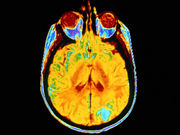Higher NT-proBNP levels linked to volumetric and microstructural markers of subclinical brain damage
THURSDAY, Dec. 8, 2016 (HealthDay News) — For older adults without dementia, higher N-terminal pro-B-type natriuretic peptide (NT-proBNP) is associated with lower total brain volume, according to a study published online Dec. 7 in Radiology.
Hazel I. Zonnevald, M.D., from the Erasmus MC at the University Medical Center Rotterdam in the Netherlands, and colleagues conducted a prospective population-based cohort study in which serum levels of NT-proBNP were measured in 2,397 participants without dementia or stroke, drawn from the population-based Rotterdam Study. The authors examined the correlation between NT-proBNP level and magnetic resonance imaging markers of subclinical brain damage.
The researchers observed a correlation for higher NT-proBNP level with smaller brain volume (mean difference in z score per standard deviation increase in NT-proBNP level, −0.021), which was mainly driven by gray matter volume (mean difference in z score per standard deviation increase in NT-proBNP level, −0.037). There was a correlation for higher NT-proBNP level with larger white matter lesion volume (mean difference in z score per standard deviation increase in NT-proBNP level, 0.090), with lower fractional anisotropy and higher mean diffusivity of normal-appearing white matter (mean difference in z score per standard deviation increase in NT-proBNP level, −0.048 and 0.054, respectively).
“In community-dwelling persons, higher serum NT-proBNP levels are associated with volumetric and microstructural magnetic resonance imaging markers of subclinical brain damage,” the authors write.
Several authors disclosed financial ties to the pharmaceutical, medical device, nutrition, and health care industries.
Copyright © 2016 HealthDay. All rights reserved.








